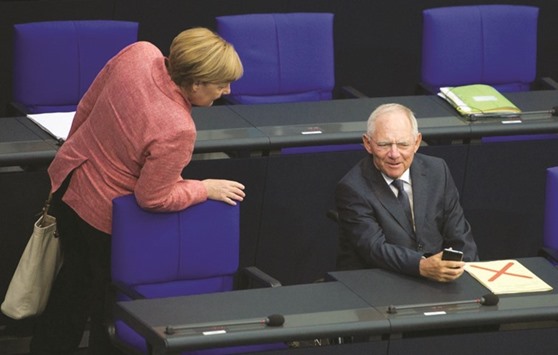For all of Germany’s political discontent, Finance Minister Wolfgang Schaeuble had a lot to trumpet as he presented the government’s 2017 budget in parliament.
Leading off a weeklong budget debate in parliament yesterday, Schaeuble cited unemployment at the lowest since East and West Germany reunited in 1990, “healthy” economic growth and rising wages and retirement benefits. Chancellor Angela Merkel’s government plans to keep government borrowing at zero and cut the national debt to the euro-area limit of 60% of gross domestic product by 2020.
“Economically, we’ve never had it so good,” Schaeuble said in his speech to lawmakers in Berlin. Portraying fiscal restraint as an anchor in unsettling times, he said that “budget policy stands for stability and reliability.”
“We’re prudently only going to spend as much as we have,” Schaeuble told lawmakers.
As Merkel faces federal elections next year while struggling with the enduring political fallout of the refugee crisis, her government can point to eight quarters of growth with continued “moderate” expansion seen ahead, record revenue and plans to balance the budget through 2020. The jobless rate, unchanged at 6.1% in August, is at a 25-year low.
Those headline economic indicators may help the government counter a rise in populist sentiment that has eroded support for the established parties. Schaeuble, a Merkel ally and the nation’s elder statesman, alluded to the rise of populism across Europe in his speech, saying policy makers need to show they can “open up opportunities” for their citizens as terrorism, migration and globalisation prompt anxiety and give rise to “demagogues.” Many Germans wonder whether prosperity will keep increasing, he said.
Campaigning for the fall 2017 election is already under way, prompting calls to use the spoils of Schaeuble’s fiscal policy to cut taxes. With federal revenue projected to rise to €349bn ($390bn) in 2020, a 10% increase compared with this year, pro-business members of Merkel’s Christian Democratic Union advocate a €30bn income-tax cut.
Schaeuble said there’s leeway for €15bn. The Social Democrats, her junior coalition partner and election rival, favour cutting social-security contributions.
Germany’s time of plenty contrasts with France and Italy, the two other biggest euro-area economies, both of which stagnated in the second quarter while Germany grew 0.4%. Schaeuble, Merkel’s guardian of fiscal orthodoxy, is Germany’s second-most popular politician after SPD Foreign Minister Frank-Walter Steinmeier. Schaeuble’s approval rating of 65% compares with 45% for Merkel, according to an Infratest Dimap poll published September 1.
Yet a year before the election, Germans may be feeling slightly less of the good times in their pocketbooks. Employers are reeling in pay gains that soared after the financial crisis, even as record-low unemployment suggests that workers’ bargaining power should be increasing.
“Reforms to the functioning of the labor market appear to have eliminated rigidity and may still be yielding dividends,” according to Bloomberg Intelligence economist Maxime Sbaihi.
“That could mean that even as unemployment has fallen, the pool of available workers has grown larger and prevented wage pressure from building.”

German Finance Minister Wolfgang Schaeuble and Chancellor Angela Merkel attend a meeting at the lower house of parliament Bundestag on 2017 budget in Berlin yesterday. Schaeuble cited unemployment at the lowest since East and West Germany reunited in 1990, u201chealthyu201d economic growth and rising wages and retirement benefits.
